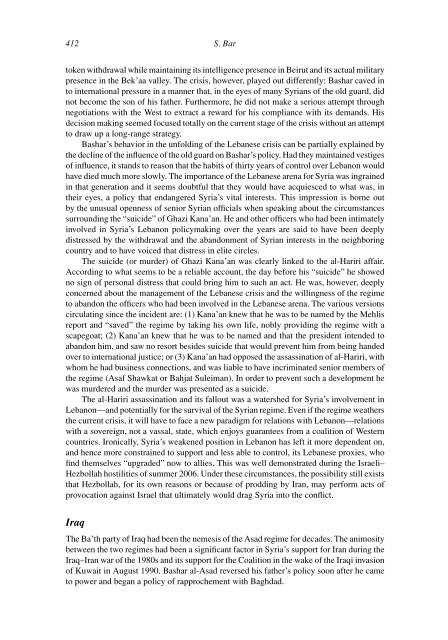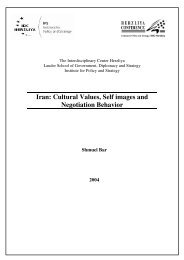Bashar’s <strong>Syria</strong> 411in their former apparatuses, using those links to plan <strong>and</strong> execute the assassination.This explanation has two alternative possibilities for a motive. <strong>The</strong> first is that theformer officials saw al-Hariri as a threat to their own personal influence <strong>and</strong> businessin Lebanon, as well as to <strong>Syria</strong>n dominance. <strong>The</strong> second possibility is that theysaw Bashar loosing his grip on Lebanon, <strong>and</strong> therefore wanted to create a situationthat would force him to revise what they saw as his inept policy. <strong>The</strong> flaw in thisexplanation is that most of the “old guard” with influence in Lebanon (such as thelate Ghazi Kana’an) are aware of the dynamics of the Lebanese arena <strong>and</strong> tend tobe cautious in the use of force that may incriminate <strong>Syria</strong>. <strong>The</strong> continued attemptsto assassinate lower-level critics of <strong>Syria</strong> after the murder of al-Hariri also raise thequestion of why, if the cause is “loss of control,” the regime had not taken any visiblesteps to reign in <strong>its</strong> “loose cannons.”<strong>The</strong>re is no doubt that there was deep <strong>Syria</strong>n involvement in the assassinations. <strong>The</strong>question is the extent of Bashar’s involvement in the affair, <strong>and</strong> what can be learned from itregarding his leadership style. Bashar’s personality <strong>and</strong> the decision-making process underhim does not support the account of his personal involvement in ordering the assassination.Rather, his aversion to political risk on one h<strong>and</strong>, <strong>and</strong> tendency to delegate authority on theother, tends to support the first explanation of “overdelegation of authority.”If this is true <strong>and</strong> senior intelligence officials set in motion one of the most disastrousblunders in the history of <strong>Syria</strong>n intelligence operations, the circumstances of the affairwould have warranted, in such an autocratic regime, either a genuine purge of the apparatusor apparatuses that acted against the policy of the president, or, at least, a bid to disengagethe president himself from responsibility by claiming that the <strong>Syria</strong>n involvement was thepersonal initiative of a mid-ranking official who has been duly punished. This latter wasthe image that Hafez al-Asad tried to project after the Hindawi affair of 1986, when he(temporarily, at least) moved aside those who were known to have been involved in theoperations attempts. However, the only senior figure to have been moved aside after theassassination was Bahjat Suleiman, <strong>and</strong> there is no evidence to date—<strong>and</strong> certainly noofficial declaration—that his dismissal was linked to the assassination.<strong>The</strong> development of the Lebanese situation offers additional insight into Bashar’s decisionmaking. <strong>The</strong> Lebanese case is particularly instructive, as Bashar had received his“apprenticeship” in politics in this theater. From the mid-1990s Bashar appeared to be informallyresponsible for the “Lebanese file” as Vice President Khaddam became more <strong>and</strong>more marginalized. He developed close ties with various members of the Lebanese elite(he was said to be close to Suleiman Tony Franjiya, the gr<strong>and</strong>son of former pro-<strong>Syria</strong>nLebanese President Suleiman Franjiyeh) <strong>and</strong> was deeply involved in <strong>Syria</strong>n manipulationof the Lebanese political scene, including the replacement of Prime Minister al-Hariri, whowas associated with Khaddam, <strong>and</strong> the <strong>Syria</strong>n Chief of Staff, Hikmat Shihabi by Salimal-Huss. 136 Pressure on <strong>Syria</strong> to withdraw from Lebanon began after the Israeli withdrawalin May 2000. <strong>Syria</strong>’s initial response to this pressure was in line with <strong>its</strong> traditional modusoper<strong>and</strong>i in that country: it supported Hezbollah’s claim that the Sheba farm area (occupiedby Israel with the Golan Heights in June 1967) was part of Lebanon, <strong>and</strong> therefore Israelhad not implemented a total withdrawal <strong>and</strong> the raison d’être for Hezbollah’s resistanceremained in force.As pressure mounted on <strong>Syria</strong> to withdraw, the conventional wisdom, grounded in thestrategic significance of Lebanon for <strong>Syria</strong> (see above) <strong>and</strong> the behavior of Hafez al-Asad,assumed that Bashar’s <strong>Syria</strong> would first procrastinate <strong>and</strong> buy time, then create a crisis thatwould put the call for an early <strong>Syria</strong>n withdrawal on the back burner, <strong>and</strong>, finally, perform a
412 S. <strong>Bar</strong>token withdrawal while maintaining <strong>its</strong> intelligence presence in Beirut <strong>and</strong> <strong>its</strong> actual militarypresence in the Bek’aa valley. <strong>The</strong> crisis, however, played out differently: Bashar caved into international pressure in a manner that, in the eyes of many <strong>Syria</strong>ns of the old guard, didnot become the son of his father. Furthermore, he did not make a serious attempt throughnegotiations with the West to extract a reward for his compliance with <strong>its</strong> dem<strong>and</strong>s. Hisdecision making seemed focused totally on the current stage of the crisis without an attemptto draw up a long-range strategy.Bashar’s behavior in the unfolding of the Lebanese crisis can be partially explained bythe decline of the influence of the old guard on Bashar’s policy. Had they maintained vestigesof influence, it st<strong>and</strong>s to reason that the hab<strong>its</strong> of thirty years of control over Lebanon wouldhave died much more slowly. <strong>The</strong> importance of the Lebanese arena for <strong>Syria</strong> was ingrainedin that generation <strong>and</strong> it seems doubtful that they would have acquiesced to what was, intheir eyes, a policy that endangered <strong>Syria</strong>’s vital interests. This impression is borne outby the unusual openness of senior <strong>Syria</strong>n officials when speaking about the circumstancessurrounding the “suicide” of Ghazi Kana’an. He <strong>and</strong> other officers who had been intimatelyinvolved in <strong>Syria</strong>’s Lebanon policymaking over the years are said to have been deeplydistressed by the withdrawal <strong>and</strong> the ab<strong>and</strong>onment of <strong>Syria</strong>n interests in the neighboringcountry <strong>and</strong> to have voiced that distress in elite circles.<strong>The</strong> suicide (or murder) of Ghazi Kana’an was clearly linked to the al-Hariri affair.According to what seems to be a reliable account, the day before his “suicide” he showedno sign of personal distress that could bring him to such an act. He was, however, deeplyconcerned about the management of the Lebanese crisis <strong>and</strong> the willingness of the regimeto ab<strong>and</strong>on the officers who had been involved in the Lebanese arena. <strong>The</strong> various versionscirculating since the incident are: (1) Kana’an knew that he was to be named by the Mehlisreport <strong>and</strong> “saved” the regime by taking his own life, nobly providing the regime with ascapegoat; (2) Kana’an knew that he was to be named <strong>and</strong> that the president intended toab<strong>and</strong>on him, <strong>and</strong> saw no resort besides suicide that would prevent him from being h<strong>and</strong>edover to international justice; or (3) Kana’an had opposed the assassination of al-Hariri, withwhom he had business connections, <strong>and</strong> was liable to have incriminated senior members ofthe regime (Asaf Shawkat or Bahjat Suleiman). In order to prevent such a development hewas murdered <strong>and</strong> the murder was presented as a suicide.<strong>The</strong> al-Hariri assassination <strong>and</strong> <strong>its</strong> fallout was a watershed for <strong>Syria</strong>’s involvement inLebanon—<strong>and</strong> potentially for the survival of the <strong>Syria</strong>n regime. Even if the regime weathersthe current crisis, it will have to face a new paradigm for relations with Lebanon—relationswith a sovereign, not a vassal, state, which enjoys guarantees from a coalition of Westerncountries. Ironically, <strong>Syria</strong>’s weakened position in Lebanon has left it more dependent on,<strong>and</strong> hence more constrained to support <strong>and</strong> less able to control, <strong>its</strong> Lebanese proxies, whofind themselves “upgraded” now to allies. This was well demonstrated during the Israeli–Hezbollah hostilities of summer 2006. Under these circumstances, the possibility still existsthat Hezbollah, for <strong>its</strong> own reasons or because of prodding by Iran, may perform acts ofprovocation against Israel that ultimately would drag <strong>Syria</strong> into the conflict.Iraq<strong>The</strong> Ba’th party of Iraq had been the nemesis of the Asad regime for decades. <strong>The</strong> animositybetween the two regimes had been a significant factor in <strong>Syria</strong>’s support for Iran during theIraq–Iran war of the 1980s <strong>and</strong> <strong>its</strong> support for the Coalition in the wake of the Iraqi invasionof Kuwait in August 1990. Bashar al-Asad reversed his father’s policy soon after he cameto power <strong>and</strong> began a policy of rapprochement with Baghdad.
- Page 4 and 5:
Bashar’s Syria 355of political im
- Page 8 and 9:
Bashar’s Syria 359a-Zur province
- Page 11: 362 S. Barof Lebanon, with which Sy
- Page 17 and 18: 368 S. Barnaturally come with the s
- Page 19 and 20: 370 S. BarSimilar behavior on the p
- Page 21 and 22: 372 S. Bardemocracy” must be foun
- Page 23 and 24: 374 S. Barcultural, political and m
- Page 25 and 26: 376 S. Barexcept for those with fam
- Page 27 and 28: 378 S. Barthe provisions for nonpro
- Page 29 and 30: 380 S. Bar The ups and downs in rel
- Page 31 and 32: 382 S. Barfamily is also linked by
- Page 33 and 34: 384 S. Bar2. The “second generati
- Page 35 and 36: 386 S. BarThe reformist trend withi
- Page 37 and 38: 388 S. Barwould allow the younger g
- Page 39 and 40: 390 S. BarFigure 3. Heads of the Sy
- Page 41 and 42: 392 S. Bar Disruption of the “hie
- Page 43 and 44: 394 S. Bar(Majlis Milli), composed
- Page 45 and 46: 396 S. Bar Other prominent Syrians
- Page 47 and 48: 398 S. BarSyrian civil society—su
- Page 49 and 50: 400 S. BarMany of the Muslim Brothe
- Page 51 and 52: 402 S. BarThese elements find reson
- Page 53 and 54: 404 S. BarIran’s proxy, Hezbollah
- Page 55 and 56: 406 S. BarWest—and specifically t
- Page 57 and 58: 408 S. BarBashar is well aware that
- Page 59: 410 S. BarBashar did not read these
- Page 63 and 64: 414 S. Barlegitimacy had eroded. Ne
- Page 65 and 66: 416 S. Barin the wake of the al-Har
- Page 67 and 68: 418 S. BarIt was Russia, however, t
- Page 69 and 70: 420 S. Baror so, with competitive p
- Page 71 and 72: 422 S. Bar10. According to the well
- Page 73 and 74: 424 S. Bar44. See Flynt Everett, In
- Page 75 and 76: 426 S. Barinternet news site, all4s
- Page 77 and 78: 428 S. Bar100. As one Sunni Syrian
- Page 79 and 80: 430 S. Bar125. Radio Damascus, 21 O
- Page 81 and 82: 432 S. BarBengio, Ofra and Gabriel
- Page 83 and 84: 434 S. BarNews agencies and Newspap
- Page 85 and 86: Regional Command;Central CommitteeR
- Page 87 and 88: Main Figures in the Syrian Ba’th
- Page 89 and 90: Main Figures in the Syrian Ba’th
- Page 91 and 92: Main Figures in the Syrian Ba’th
- Page 93 and 94: Main Figures in the Syrian Ba’th
















